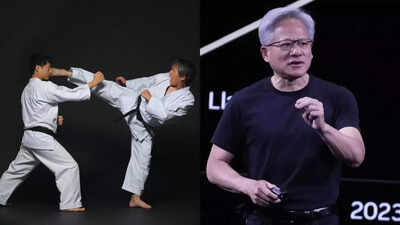Jensen Huang’s big take on fitness: “Martial arts makes you humble. It teaches…” |

At the Nvidia AI Summit in Mumbai, amidst deep discussions on artificial intelligence and technology, Nvidia CEO Jensen Huang opened up about how martial arts has shaped his personal philosophy and leadership style. For Huang, martial arts is more than just physical exercise — it is a lifelong teacher that cultivates humility and strength of character. He believes it instills crucial qualities like patience, discipline, and confidence, which are essential not only in fitness but also in navigating life’s toughest challenges, including the fast-evolving world of technology and innovation. His reflections drew as much attention as his AI insights, striking a chord with the audience.
Jensen Huang: Martial arts as a path to humility
Huang emphasized that martial arts teaches humility by showing practitioners that mastery is a continuous journey. No matter how skilled one becomes, there is always more to learn, and the process requires respect for oneself and others. This humility, he said, is vital in leadership, helping one stay grounded and open to new ideas. He added that in both martial arts and business, arrogance can be a leader’s downfall, while humility keeps the mind clear for growth and innovation. For Huang, acknowledging one’s limitations is the first step toward lasting success.
The role of patience and discipline
According to Huang, martial arts demands patience and discipline — qualities that enable a person to push through setbacks and maintain focus over the long term. These traits are transferable to any professional environment, especially in high-pressure tech industries where resilience and consistent effort are key to success. He observed that discipline in training mirrors discipline in project execution, where long-term persistence often outweighs bursts of energy. Patience, he noted, is just as essential in innovation, as groundbreaking technologies often take years to develop.
Building confidence through martial arts training
Martial arts build confidence not just physically but mentally. Huang shared that mastering the precise movements and strategic thinking required in his practice helps him approach complex problems with assurance and clarity, which benefits both personal growth and professional leadership. This confidence is not about ego, he clarified, but about having the inner strength to face challenges head-on. He credited his martial arts background for giving him the calmness to make tough decisions under pressure, both on the mat and in corporate boardrooms.
Martial arts and technology leadership
Drawing parallels between martial arts and his role at Nvidia, Huang noted that the same patience, discipline, and confidence needed on the mat also guide him in steering innovation safely and effectively. The principles cultivated in martial arts support his vision of building technology that serves humanity responsibly. He related that the focus one develops during training helps in filtering distractions and making precise, thoughtful moves in business, much like in sparring. This mindset, he suggested, is essential in leading teams through the rapid, unpredictable shifts of the tech industry.
Discover more from Supreme News Today
Subscribe to get the latest posts sent to your email.


